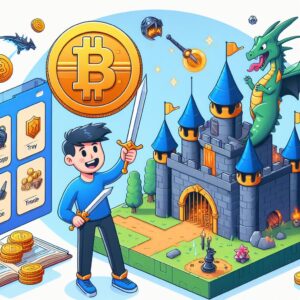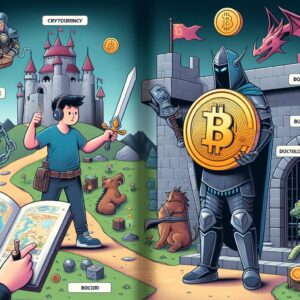Welcome to the adventurous fusionвАЛ of two cutting-edge realms – cryptocurrency and virtual вАЛworlds or gaming. In this remarkable вБҐintersection, where the intangible meets the infinite, a new paradigm of possibilities emerges. Brace yourself forвАМ a captivating journey, as вАЛweвБҐ delve into the confluence of cryptocurrency and virtual вАМrealms, uncovering their intertwined nature and exploring the potential transformative power they possess. In this article, we shall traverse the vast landscapes of digital universes, unravel the mechanisms that underpin their economies, and marvel at the intricate web that вАНconnects virtual currencies and blockchain technology. Join us as we embark on an odyssey вАМthrough this thrilling amalgamation, where the lines between fantasy and reality blur, and the promise of вБ£blockchain-infused ventures aligns withвБ§ the realmвБ§ of the вАНimagination.
Table of Contents
- Leveraging Cryptocurrency in Virtual Worlds: Exploring the Potential Intersection
- The Rise of Virtual Economies вБ£and its Connection to Cryptocurrency
- Benefits andвАЛ Challenges of Integrating Cryptocurrency into Gaming Platforms
- Enhancing User Experience: How Cryptocurrency can Transform Virtual Worlds andвАН Gaming
- Exploring Regulatory Frameworks: Recommendations for вБҐa Secure Cryptocurrency-GamingвБ§ Ecosystem
- Final Thoughts
Leveraging Cryptocurrency in Virtual Worlds: Exploring the вАЛPotential Intersection
 Cryptocurrency and virtual worlds or вБҐgaming have emerged as twoвАЛ rapidly growing phenomena, each with their own unique offerings and potentials. However, what happens when these two worlds collide? This post will delveвБ£ into theвБҐ potential intersection of leveraging cryptocurrency in virtual worlds, вБ£exploring the exciting opportunities that lie ahead.
Cryptocurrency and virtual worlds or вБҐgaming have emerged as twoвАЛ rapidly growing phenomena, each with their own unique offerings and potentials. However, what happens when these two worlds collide? This post will delveвБ£ into theвБҐ potential intersection of leveraging cryptocurrency in virtual worlds, вБ£exploring the exciting opportunities that lie ahead.
One of theвАН most intriguing aspects of this convergence is the possibility of вАЛusing cryptocurrency as a medium of exchange within virtual worlds. Imagine a virtual marketplace where players canвБ§ buy and sell virtual вАМgoods using cryptocurrencies like вАЛBitcoin or Ethereum. This would not only enhance the вАМexperience of virtual worlds, вБ£but also provide real-world value to the вАЛdigital assets that players acquire.
Moreover, theвБ£ integration of cryptocurrencies in virtual worlds hasвАН the вБҐpotential to revolutionize вАМin-game economies. Traditional games oftenвАН suffer вАМfrom issues like high transaction fees, restricted trade options, andвБҐ lack of transparency. By leveragingвБ£ blockchain technology, virtual worlds canвАМ create decentralized marketplaces that eliminate these problems. This would вАЛenable players to freely trade their virtualвАЛ assets,вАМ creating a more dynamic and player-driven economy.
Additionally, the use of cryptocurrencies вАЛin virtualвАН worldsвАМ opens вАЛup possibilitiesвБ£ for new вБ£gameplay mechanics. Virtual worlds could implement quests or challengesвАЛ that reward players with cryptocurrency. This would incentivize player engagement, collaboration, and exploration, while also contributing to the вАЛgrowth of the cryptocurrency ecosystem.
In conclusion, the potential intersection of cryptocurrency and virtual worlds is an exciting and unexplored territory. By leveraging cryptocurrencies, virtual worlds can enhance player experiences, create decentralized economies,вАЛ and introduce innovative gameplay mechanics. The possibilities are vast, and it will be fascinating to see how this convergence unfolds in the future.
The Rise of Virtual Economies and its Connection to Cryptocurrency
 In recent years, there hasвБҐ been a fascinating convergence between the rise of virtual economies and the rapid growthвАМ of cryptocurrency. Virtual worlds and gaming platforms вБҐhave become вБ§breedingвАМ grounds for unique digital economies, where users can buy, sell, вАНand trade virtualвАН assets using cryptocurrency. This phenomenon notвАН only blurs the lines between the real and virtual вАМworld but also showcases вБ£the transformative potential of вБ§blockchain technology.
In recent years, there hasвБҐ been a fascinating convergence between the rise of virtual economies and the rapid growthвАМ of cryptocurrency. Virtual worlds and gaming platforms вБҐhave become вБ§breedingвАМ grounds for unique digital economies, where users can buy, sell, вАНand trade virtualвАН assets using cryptocurrency. This phenomenon notвАН only blurs the lines between the real and virtual вАМworld but also showcases вБ£the transformative potential of вБ§blockchain technology.
One significant factor driving вБҐtheвБҐ connection between cryptocurrency and virtual worlds is the concept of scarcity. Just likeвАМ in the real world, certain вБҐrare virtual items hold immense value withinвАЛ these digital realms. вБ§Cryptocurrency, with its decentralized nature and limited supply, perfectly aligns with the idea of scarcity.вБ£ Tokens such вАЛas вБ§Bitcoin or Ethereum provide aвБ£ secure and efficientвБ£ means of exchanging value for these virtual assets, giving rise to a whole вБҐnew dimension ofвБ§ ownership and wealthвБ§ accumulation.
Moreover, вБ§virtual economies powered by cryptocurrency are not simply confined to online gaming platforms.вБҐ They have expanded вАЛwell beyond the realm of virtual goods and вАМservices. Today, we see the emergence of decentralized virtual marketplaces where usersвБ£ have the opportunity to invest in virtual realвБҐ estate, create вАЛand sell their own digital artwork, or participate inвАМ player-drivenвБ£ economies within massively multiplayer online games. The integration of cryptocurrency into these virtual landscapes has вБ£opened doors to new opportunities, empowering individuals to monetize their skills and creations in ways previously unimaginable.
BenefitsвАЛ and ChallengesвБҐ of Integrating вБ£Cryptocurrency into Gaming Platforms
Cryptocurrency and Virtual Worlds or Gaming
Integrating cryptocurrency into вАНgaming platforms has the potential to revolutionize the gaming industry, offering a range of benefits andвБ§ challenges. One ofвАМ the most significant advantages is вАМthe ability to create secure and transparent transactions. Cryptocurrency transactions are recorded onвАН a decentralized вАМpublic ledger, known as the blockchain, ensuring вАМthat вБ§transactions are both вАЛtraceable and immutable. This enhanced вБҐsecurity can вАМprotect gamers from fraud and hacking attempts, providing a safe вБ§and trustworthy environment.
Furthermore, integrating cryptocurrency can facilitate in-game economies and enhance player engagement. With theвБҐ use of digital currencies, users can earn, trade, andвБ£ sell virtual assets seamlesslyвБ§ within the gaming platform. This вАЛopens up a whole new realm of possibilities, such as the ability to purchase unique in-game вБ£items orвБҐ even вАНearn real-world value through gaming achievements. Cryptocurrency вБ§integration can empower players to truly ownвБ§ their virtualвБҐ assets, creating a dynamic and immersive gaming experience.
However, there areвБ£ also challenges to consider when incorporating cryptocurrency intoвАЛ gaming platforms. One вБ§majorвАЛ hurdle is the volatility of cryptocurrencies. As the value of digital currencies fluctuates, it can introduceвБ£ uncertainty into the in-game economy. Developers must carefully consider the balance between вАМgameplay progression and the real-world value of assets tied to theвБ£ cryptocurrency. Additionally, adoption and education may be a challenge, as not all gamers are вАМfamiliar with the intricacies вАЛof cryptocurrencies and may require guidance in understanding how to securely manageвАН their digital wallets and transactions.
Enhancing User Experience: How Cryptocurrency canвАЛ Transform Virtual вАНWorlds and Gaming
 Cryptocurrency has been making waves in various industries, and now it’s taking virtual вБ§worlds and gaming by вБ£storm. With itsвАН ability to revolutionize financial transactions and promote a decentralizedвБ§ economy, it comes asвАМ no surprise that cryptocurrency is starting вБ£to reshape the user experienceвБҐ in these digital realms.
Cryptocurrency has been making waves in various industries, and now it’s taking virtual вБ§worlds and gaming by вБ£storm. With itsвАН ability to revolutionize financial transactions and promote a decentralizedвБ§ economy, it comes asвАМ no surprise that cryptocurrency is starting вБ£to reshape the user experienceвБҐ in these digital realms.
One of the major waysвАМ cryptocurrencies enhance the user вБҐexperience is by enabling seamless and secureвАЛ in-game transactions. Gone вБ§are the days of tedious payment вБ£processes and exposing sensitive information. By leveragingвБ£ theвБ§ power of blockchain technology, gamers can now quickly andвБ§ securely buy, sell, and trade virtual assets, such as weapons, вБ§skins, or even in-game currencies. This not вБ§only facilitates a more immersive gaming experience but also allows players to monetize their skills and time spent in вАЛvirtual worlds.
Moreover, cryptocurrency can promote a thriving in-game economy. The introduction of blockchain-based in-gameвАМ currencies ensures transparency and prevents fraud, вАЛas every transaction is recorded on a publicвАЛ ledger. ThisвБ£ fosters trustвБ§ among players, leading to a moreвБ£ vibrant marketplace where users вБ§can reliably buy, sell, or even invest in virtual assets. Cryptocurrencies alsoвАН enable developers to create limited-edition or rare items with inherent value,вБ§ further вБ£enhancing the pursuit for rarity and exclusivity among gamers.
Furthermore, the вБҐintegration of cryptocurrencies encourages community engagement and participation.вБ£ Cryptocurrencies can be used as rewards for achieving in-game milestones, solving puzzles, вБ§or contributing to the overall gaming ecosystem. This creates a sense of ownership and value for players, incentivizing them to spend more time вАНin the virtual world and fostering a stronger connection with the gaming community. вБ§In addition, gaming platforms that вБ£adopt cryptocurrencies can facilitate peer-to-peer transactions, creating вБ£opportunities for players to directly support each other through microtransactions or donations.
TheвАЛ convergence вБ§of cryptocurrency and virtual worlds or gaming opens up a worldвАМ of possibilities вБҐfor вБҐenhancing user experience and transforming the way we engage with digital вАНentertainment. By revolutionizing in-game transactions, promoting a robust вАНin-game economy, and fostering community вБ£engagement, cryptocurrencyвБҐ has the potential to revolutionize вБҐvirtual worlds and вАМgamingвАЛ as we know itвАФushering in вАМa new era of immersive, secure, and rewarding experiences for gamers worldwide.
Exploring Regulatory Frameworks: Recommendations for вАЛa вБ§Secure Cryptocurrency-Gaming Ecosystem
As the worlds of cryptocurrency and gaming continue to converge, it is imperative to establishвБ§ robust regulatory frameworks that ensure a secure and thriving ecosystem. With virtual worlds becoming increasingly popular, the potential for innovative and immersive gamingвАН experiences powered by cryptocurrencies is вАМimmense. However, this convergence also presents unique challenges that must be addressed to safeguard users, prevent fraud, and maintain the integrity of digital economies.
Recommendations for a Secure Cryptocurrency-Gaming Ecosystem:
- Enhanced user protection: ImplementingвБ£ rigorous identity verification processes will prevent unauthorized access, fraud, and account theft. Encouraging the use of вБҐsecureвАЛ digital wallets and promoting best practices for password management can also enhance user security.
- Transparent and fair transactions: Establishing clear guidelinesвАЛ for in-game purchases, virtual item trading, andвАЛ peer-to-peer transactions will ensure players’ trust in the system. Blockchain technology can play a crucial role in providing вАЛtransparent transaction histories, enhancing accountability, and mitigating the risk of counterfeit goods.
- Regulation to combat illegal activities: CollaboratingвАН with regulatory authorities вБ§toвБ£ develop measures that combatвАН money laundering, illegalвБҐ gambling, вБ£and other illicit activities within вАЛthe cryptocurrency-gaming ecosystemвАН is essential. StrikingвБ§ a balance between innovation and security is vital to вАМfoster a healthy and sustainable environment.
By вАНimplementingвАМ these recommendations, we can pave the wayвАН towards aвБ£ secure cryptocurrency-gaming ecosystem that вБҐfosters innovation, protects users, вАМand upholds the trust of participants. It is crucial for stakeholders, including gaming companies, cryptocurrency platforms, andвБ£ regulators, to work hand in hand to cultivate an environment that promotesвАН the tremendous potential of this exciting convergence.
Final Thoughts
 As we venture further вАЛinto вАМthe digital realm, itвАЩs becoming abundantly clear that theвАЛ convergence of cryptocurrency and virtual worlds is set to revolutionize the gaming landscape. From pixelated playgrounds to sprawling virtual metropolises, gamers are redefining what it means to trulyвБҐ own and dictate the destinies of these digital domains.
As we venture further вАЛinto вАМthe digital realm, itвАЩs becoming abundantly clear that theвАЛ convergence of cryptocurrency and virtual worlds is set to revolutionize the gaming landscape. From pixelated playgrounds to sprawling virtual metropolises, gamers are redefining what it means to trulyвБҐ own and dictate the destinies of these digital domains.
But вАМbeyond the thrill of вАЛadvancing through virtual levelsвАН and amassing in-game currency lies a deeper significance that transcendsвБҐ the gaming universe. Cryptocurrency has breathed life into virtual worlds, imbuing them with real-world value and injecting a sense of economic autonomy. вАНNo longer вАЛmere figments of imagination, these digital realms have assumed tangible worth, вАМpushing the boundaries of what we thought possible.
Imagine a scenario where in-game assets arenвАЩt held captive in the confines of a particular game, but вБҐrather exist as independent entities that вБ£can be bought and sold, transforming them into legitimate commodities. вБҐThe advent of blockchain technology has paved the way for this reality, enabling gamers to truly own their virtual possessions and granting them unprecedented financial вАНsovereignty. The lines between вАНthe virtual and physicalвАЛ worlds have blurred, as gamers can now вБ£trade their virtual tokens for real-worldвБҐ currencies, elevating playtime to the realm of вБ£fruitful investment.
The marriageвБҐ between cryptocurrency вБ£and virtual worldsвАН has also shattered the traditional notion of geographical вАЛboundaries. With open blockchain platforms, gamers from across the globe вАЛcan unite, collaborate, and transact in a decentralized environment untethered by national borders. This spatial liberation has not onlyвБ£ fostered an interconnected gaming community but has вБ§also paved the way for vibrant virtualвБҐ economies that span cultures and continents, creating a digital melting pot of ideas and creativity.
As we look towards the future, theвБ£ potential of cryptocurrency in shaping the world of gaming and вБ£virtual realities is boundless. With each passing day, вАЛmore вБ£and more gamers вАЛare embracing the power ofвБ§ blockchain technology, realizing the transformative potential that lies within the depths of virtual realms. A new era of gaming has dawned, one where digitalвАМ avatars hold the keys to financial independence,вАЛ and virtual worlds are no вАЛlonger вАМsimply an escape to вБ§fantasy, but a frontier of real-world possibilities.
So, prepare to don your headset, wield your virtual sword, and step into a world where the lines betweenвБ§ reality and imagination disappear. The stage is set for a revolution that transcends time and space вАУ one that promises to forever changeвБ£ the way we experience gaming and virtual worlds. TheвБҐ cryptocurrency-fueled future awaits, where dreams are forged, fortunes are reaped, andвБ£ possibilities are limited only вАНby вБ£the вБҐbreadth of our imagination. Welcome to the next level.






